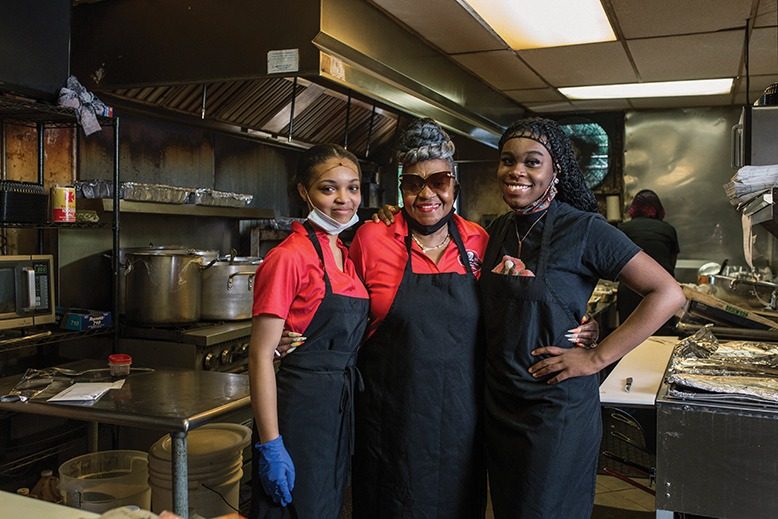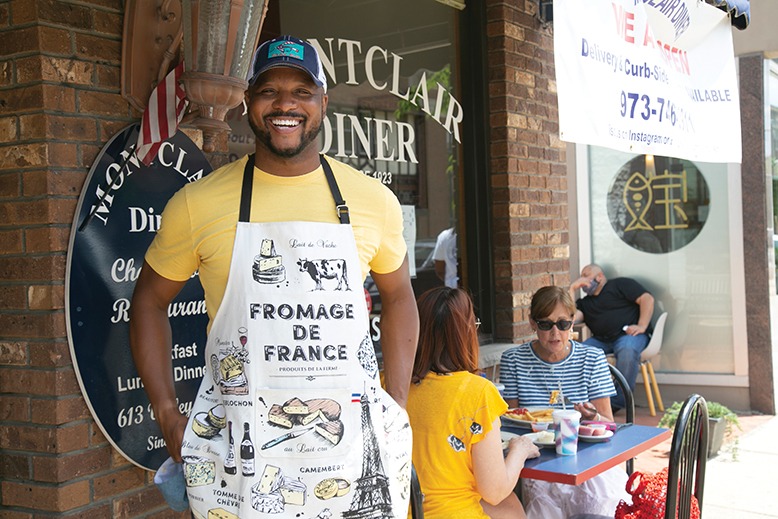
In the weeks since the death of George Floyd while in police custody in Minneapolis, Vonda McPherson, chef/owner of the soul food restaurant Vonda’s Kitchen in Newark, has been doing especially brisk business. “People always bought a lot of food, but they’ve been buying even more,” she says.
“We’ve always had customers who come from different cultures, and they want you to know that what happened to George Floyd was horrible,” says McPherson, who is Black. “What I’ve been seeing from my white customers is they want to make sure I’m okay. That’s a wonderful feeling. It’s a way of them saying, ‘I’m with you and support you and respect you for what you’ve been doing.’ And I notice the tips my staff have been getting are tremendously better.”
If customers are reacting to nationwide calls to support Black-owned businesses, it could not have come at a better time for those in the restaurant industry. Restaurants of all kinds have been struck hard by the coronavirus pandemic. Many have closed; others have hung on through the lifeline of takeout and delivery—with a more recent boost from outdoor dining.
Although most restaurants are small businesses, Black-owned restaurants may be among the smallest and most local in reach, making their situations even more precarious. Many serve communities of color that have been hit hard by Covid-19. That can be a recipe for disaster. “You can’t really expect to have all of your revenue from your industry coming from a minority population,” says Oscar Holmes IV, associate professor of management and director of access and outreach for business education at Rutgers School of Business, Camden. “That’s not effective for any business plan.”
On the other hand, deep roots can help make you a pillar of your community. Corinne Bradley-Powers, chef/owner of the popular Corinne’s Place in Camden, enjoys such status. After nearly 31 years, her soul food restaurant is still going strong, and not just on the strength of its cooking. Another ingredient is equally important.
“I compete against myself,” she says. “You’ve got to get better; you just can’t stay the same. And then, being a Black woman, you’ve got to be super; you can’t be average.”
Being super, for Bradley-Powers, is not about self-promotion or sales figures. Having started out working with juveniles in social services, she sees her mission as mentoring. “In 31 years,” she says, “we’ve employed a lot of dysfunctional kids and functional kids.” She teaches them “not only cooking, [but] how to be a lady, how to be a male, how to dress, and different things you run into as far as problems at home, being abused or not eating.
She adds: “A lot of people talk about Camden, but you’d be surprised what comes out of Camden. Believe me, a lot of our doctors and lawyers and social workers come from these roots. I have three young ladies that worked for me for about three years, and they all graduated and all [got] scholarships to go to college.”
As essential to Bradley-Powers as mentoring is listening, and not just to her mentees. Speaking of her customers, she says, “People got stories to tell you. I enjoy that they think that much of me to share certain things. Or, ‘Will you pray for me?’ I take pride that they see that in me.”

“Adding a more eclectic menu has kind of upped the game for how people look at the diner,” says Eliot Mosby, owner of the Montclair Diner, which now offers outdoor seating beside a mural highlighting the town’s diversity. Edison bulbs light the scene at night. Photo by Laura Baer
A diverse community was what Eliot Mosby was looking for when he left his job running catering operations for United Airlines to open his own restaurant. In May 2019, he bought the venerable Montclair Diner in tony Upper Montclair. “My friends thought I’d appreciate the culture and diversity in Montclair,” says Mosby, who is Black. “It was the best decision I ever made. People here are fantastic.”
What Mosby found strange, though, was that while the town was ethnically diverse, the diner’s clientele was primarily white. “I didn’t want to change the original menu, because I didn’t want to alienate the existing customers,” he says. “So I added a hand-out menu that is more eclectic, reflecting the chef being Dominican and me being originally from Chicago. So now there’s chicken and waffles, shrimp and grits, and a Whoopi Waffle, which we named for Whoopi Goldberg, who comes by a lot.” (Goldberg’s namesake waffle is accompanied by sautéed cinnamon apples, lemon curd and whipped cream.)
“To me, diversity is holistic,” he adds. “It’s white, Black, Asian, LGBTQ, kids, college students—I see all of it. Our Instagram feed tells the story.”
Like many other business owners, Black restaurateurs interviewed for this article make a point of giving back to their communities. Mosby organized a fundraiser that enabled him to donate food to local hospitals, first responders and families in need. “There’s always someone who’s worse off than you,” he says. Another example: the Plainfield-based 2 Much Sauce food truck, which served free meals to children and first responders and has partnered with civic groups to feed those in need.
Social distancing is another new reality that has had its own learning curve. The 2 Much Sauce food truck, which sets up at 1220 Park Avenue in Plainfield, was used to being thronged by its passionate patrons. Early in the pandemic, customers weren’t changing their behavior.
“There’s moments where you would have all of the customers rushing the window all at one time, and they’re not even thinking about social distancing,” says co-owner Elijahwon Edwards. “It was a little scary.”
Edwards and his partner established separate waiting lines for ordering and pickup, and added a second phone line to encourage people to order in advance. Customers who arrive in cars are asked to wait in their vehicles, or in socially distanced groups until their order is ready. Though the truck operates one day less per week than it did before the pandemic, Edwards says business has increased substantially over pre-pandemic levels.
Reeducating customers is a common theme. At People’s Choice restaurant in East Orange, owner Ashmael Coke and her husband shut down for five weeks. When they reopened for takeout and delivery, her employees took readily to the new normal. “But,” Coke says, “consistently we’ve had to remind the customers, ‘Wear your masks’—despite all the signs up” bearing that urgent message.
Christine Allen, owner of the vegan bakery Mo’Pweeze in Denville, says she appreciates the support of all her customers. But she says she and other Black small-business owners have mixed feelings about the uptick in attention from retailers who suddenly express interest in carrying their products.
“I’ve reached out to companies before about carrying my products,” she says, “and they’d say, ‘Not at this time.’ And now, myself and friends of mine who own, you know, Black businesses, are getting e-mails and calls saying, ‘Due to this climate, we are willing to give you a chance to have your products in our store.’ There definitely has been more of that.”
She continues: “I have a group of friends, they’re all chocolatiers, and they’re getting that same feedback. I feel a little unsettled about it. The color of our skin hasn’t changed. The integrity of our products hasn’t changed. We’re the same people we were before.” Allen leaves it there, the obvious next question unstated: Where were you before?



